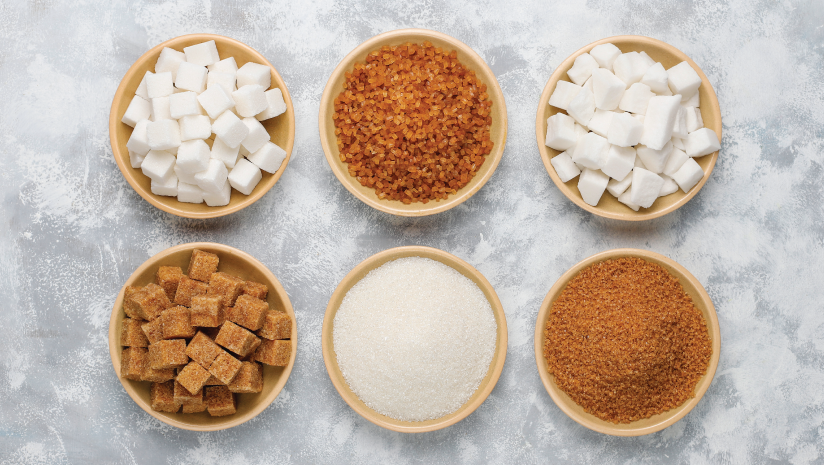Demerara sugar is a natural food obtained from the juice of sugar cane, being considered healthier than other types of sugar, such as crystal and white, because it contains some minerals, such as magnesium, calcium and potassium. In addition, demerara sugar also has bactericidal properties, helping to heal wounds.
However, demerara sugar should not be consumed in excess, as it contains a high glycemic index, a type of carbohydrate that rapidly increases blood glucose levels, which can cause diabetes or worsen the health condition of those who already have the disease. Discover other foods with a high glycemic index.
Demerara sugar has a firm texture and larger crystals, in addition to having a flavor similar to caramel, and can be used to sweeten beverages such as coffee and juices, or in preparations such as cake, sweets and jellies.
Is demerara sugar healthy?
Despite having some minerals, such as calcium, magnesium and phosphorus, which are important for the proper functioning of the body, demerara sugar also contains sucrose, a type of sugar that is quickly absorbed by the body, increasing blood glucose levels and causing insulin resistance and diabetes.
In addition, excessive sugar consumption can also increase inflammation in the body’s cells, causing cardiovascular diseases such as heart attack, stroke and atherosclerosis.
Because it has a high glycemic index, demerara sugar can facilitate the appearance of wrinkles and sagging skin, because it causes the formation of advanced glycation products (AGEs), inflammatory compounds that are produced in the skin when you eat foods with a high glycemic index, such as white bread, sugar, ice cream or cake.
possible benefits
As it contains minerals such as potassium, magnesium and phosphorus, some of the possible benefits with the consumption of demerara sugar are:
- It can help prevent blood pressure, because it contains potassium and magnesium, minerals that help eliminate excess sodium from the body in the urine and relax blood vessels;
- It can prevent osteoporosis, for containing calcium and phosphorus, minerals that are important for the formation and maintenance of bone health, preventing falls and fractures.
Importantly, there is still no scientific proof of the health benefits of demerara sugar. Therefore, to avoid health problems, it is recommended to practice physical activities regularly and maintain a balanced diet, prioritizing the consumption of fresh foods, such as fruits, vegetables, whole grains, legumes and lean proteins. See other tips for eating a balanced diet and maintaining health.
Can demerara sugar make you fat?
Despite containing minerals, demerara sugar has the same amount of calories as other types of sugar. Each 1g of sugar contains 4 calories, so excessive consumption of demerara sugar can increase the calories in the diet, causing weight gain.
Demerara sugar can make you fat because it is a high glycemic index carbohydrate, rapidly increasing blood glucose and insulin levels. This rapid rise in insulin levels causes a very rapid drop in blood glucose levels, causing increased hunger and promoting weight gain and obesity.
What is the difference between demerara and brown sugar?
As it is an unrefined sugar, demerara sugar has larger grains and contains some minerals such as potassium, calcium, phosphorus and magnesium. However, this type of sugar contains lime, a chemical additive used to whiten some types of sugar, such as crystal sugar, white and demerara.
Brown sugar, on the other hand, has great amounts of potassium, calcium, phosphorus, magnesium and iron. Also, this type of sugar is healthier because it doesn’t contain lime. Because it is not refined, brown sugar has larger and darker grains, which do not dilute easily and have a stronger flavor, which can alter the flavor of some preparations.
nutrition information table
The table below provides nutritional information for 50 g, which is equivalent to 10 teaspoons of demerara sugar:
|
Components |
50 g (10 teaspoons) of fresh sugar |
|---|---|
|
Energy |
195 kcal |
|
Carbohydrate |
49 g |
|
Protein |
0 g |
|
Fat |
0 g |
|
Fibers |
0 g |
|
Calcium |
20 mg |
|
Magnesium |
3.5 mg |
|
Phosphor |
3.5 mg |
|
Potassium |
27mg |
|
Iron |
0.5mg |
To obtain the benefits of moderate consumption of demerara sugar, it is essential to maintain a balanced and healthy diet, associated with regular physical exercise.
how to consume
The World Health Organization’s recommendation for sugar intake is 5 to 10% of the total daily caloric value of the diet for adults and children. A person who consumes 1800 calories a day can consume between 90 and 180 calories of sugar, which corresponds to between 22.5 and 45 grams of sugar a day, for example.
Demerara sugar has a flavor similar to molasses and can be used to sweeten beverages such as coffee, teas and juices or in preparations such as cakes, breads, jams and jellies.
who can’t consume
Demerara sugar is not suitable for people with diabetes, as consumption of this food can increase blood glucose levels, causing complications such as kidney problems, poor circulation, glaucoma, heart attack or stroke.
